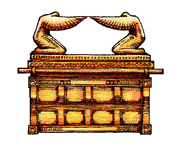The Ark Under the Temple Mount
During the course of these investigations one of the-workers noticed water seeping from the wall. A stone was moved, revealing a vaulted chamber, the original entrance to the Temple Mount from Warren Gate. From this another lower chamber was discovered, and here, according to the two rabbis, is the ark of the covenant, along with the table of shewbread and the seven-branched lampstand. What is not clear from the reports is how the two rabbis know what is there, for it is not specifically stated that they saw these items. Yet they are quoted as saying with complete certainty that they are there.
What seems to have happened then is that the Muslim authorities got wind of the excavations being made, due to leakage of water from a cistern on the Temple Mount, which is honeycombed by cisterns. They created a big row over the matter, and were allowed to seal up the entrance to Warren's Gate to prevent access. The Israeli Government, as the story goes, is eager to play down the whole matter, fearing the conflict which would be provoked if the religious Jews were able to establish that the ark was there and tried to insist on the right to build a new temple on the Temple Mount.
ne would expect there to be a great deal of pressure over the matter from religious Jews if they believed the ark was really there. One answer to this is that it would present a problem to the religious Jews themselves if the ark was produced. Due to Gentile domination over the land they regard themselves as ritually unclean, and unable to handle anything as holy as the ark. Rabbis Getz and Goren in fact have said that they have no desire to press the matter any further, preferring to await the coming of Messiah to cleanse the land, thus allowing the ark to be brought forth.
However, there are those who want to build a Jewish temple on the Mount. Will they be content with leaving the ark of the covenant in its resting place, if indeed it is there?
Conclusion - The witness of Jeremiah
As already indicated, we very much doubt that the object venerated by the Ethiopian Church is the true ark of the covenant, though it may well be an ancient replica. The evidence for it being under the Temple Mount is not very satisfactory at present, but the idea that it was hidden there does have some plausibility. But what relevance does it all have anyway?
There is a verse in Jeremiah which indicates that the matter of the ark of the covenant is an issue of some consequence prior to the establishing of the Kingdom: "And it shall come to pass, when ye be multiplied and increased in the land, in those days, saith the LORD, they shall say no more, The ark of the covenant of the LORD; neither shall it come to mind: neither shall they remember it; neither shall they miss it; neither shall it be made any more" (3:16, RV mg.). The context is clearly that of the Kingdom, for verse 17 goes on to say: "At that time they shall call Jerusalem the throne of the LORD; and all the nations shall be gathered unto it, to the name of the LORD, to Jerusalem".
The verse is clearly saying that the Jews will not be concerned about the ark of the covenant when the Kingdom is established and Messiah rules the world from Jerusalem. However, the words "no more" indicate that there is a time when they do concern themselves about the ark. Does this apply to the Jews of Jeremiah's day, concerned about the loss of the ark when the Babylonians destroyed the city? Or does it refer to a heightened interest in the matter of the ark when the Jews return to the land in the last days?
Jeremiah 3 does not seem
to be a prophecy given in the context of the imminent
fall of the city to Nebuchadnezzar; it is in a section of
prophecies which appear to relate to the time of Josiah
when there was no thought of the city falling to enemy
hands. We take it therefore to be a prophecy of a state
of affairs to apply in the land shortly before the return
of Christ, when the topic of the ark has become of great
interest to the Jews. The fact that there has been some
interest in recent years in the discovery of the ark of the
covenant is therefore fulfilling this prophecy, and
provides a sign of the times, a sign that the
establishing of the Kingdom is near. If our application
of the prophecy is correct, then we should expect
heightened interest to develop in the years ahead.
Final section: Footnotes

